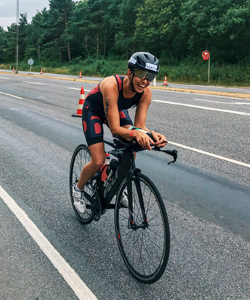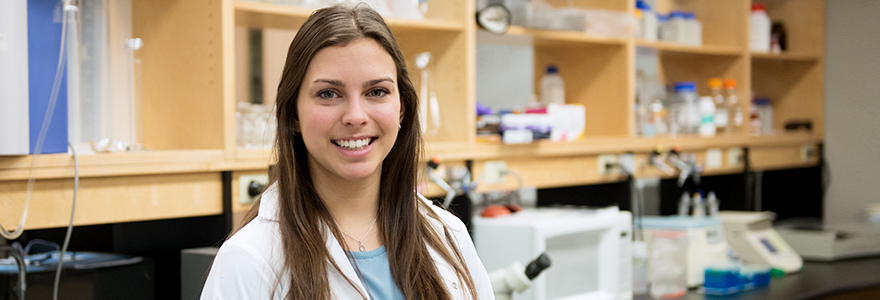Seven hours, seven years: Endurance in sport and science
By Emily Leighton, MA’13
One hour for every year of her MD/
“Apparently I like long endurance sports and long degree programs,” she said with a laugh. “I like to test my mental strength.”
Competing as part of Team Canada at the Age Group World Championships, she completed a three-kilometre swim course, 120-kilometre bike and 30-kilometre run. After taking up triathlon training at the end of her undergraduate degree at the University of Toronto, Roseborough says she was easily hooked. “It’s almost meditative,” she explained. “I can’t think about how far I have to go, I just have to focus on the moment and focus on my breathing.”
After taking up triathlon training at the end of her undergraduate degree at the University of Toronto, Roseborough says she was easily hooked. “It’s almost meditative,” she explained. “I can’t think about how far I have to go, I just have to focus on the moment and focus on my breathing.”
“It has forced me to be more aware of myself, to be very in tune with my own body,” she added.
The 25-year-old is now working with a coach to become more competitive in the sport. Her upcoming athletic goals include focusing on speed at shorter distances and racing again at the World Championships in 2020.
Roseborough started the exciting seven-year journey toward her MD/
She recalls the exact moment the acceptance email arrived in early March last year – the notification flashed on her smartwatch as she was chopping sweet potatoes in her kitchen. “I’d never before received an email that determined the next seven years of my life,” she said.
Working with co-supervisors Shawn Whitehead,
As people age, their brain’s white matter loses integrity – a process that is amplified in neurodegenerative diseases such as Alzheimer’s.
“My goal is to improve our understanding of how the white matter ages, and what kind of markers we can look at using brain imaging that
Roseborough also completed a master’s degree in clinical anatomy with Whitehead’s lab, which made the transition to
Medical school was always a goal, but her experience with basic science research, as well as Whitehead’s mentorship, motivated her to consider the MD/
“I could no longer envision a career that didn’t include both research and clinical practice,” she explained. “I want to be able to ask questions and explore the ones we aren’t yet able to answer for patients.”



